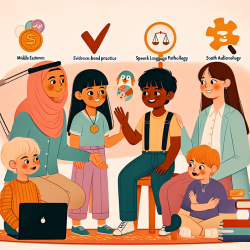Introduction
Recent research highlights the potential benefits of teaching English as a Foreign Language (EFL) to students with Autism Spectrum Disorder (ASD). The study, conducted in Iran, explores how EFL can enhance social skills and willingness to communicate (WTC) among these students. This blog delves into the findings and implications for practitioners in the field of speech-language pathology and education.
Research Overview
The study, titled "The Efficacy of Teaching English as a Foreign Language to Iranian Students with Autism Spectrum Disorder on Their Social Skills and Willingness to Communicate," utilized a mixed-method approach. Eighteen students from Kerman Province were divided into experimental and control groups, receiving 67 hours of language instruction over 15 sessions. The sessions included both individual tutorials and paired classes, with assessments conducted before and after the intervention.
Key Findings
- Social Skills Improvement: Students in the experimental group showed a significant increase in social skills, as reported by parents and caregivers. The improvement was particularly notable in students with mild-functioning ASD.
- Increased Willingness to Communicate: The study found a marked increase in WTC in the experimental group, with students initiating communication more frequently during English classes.
Implications for Practitioners
For practitioners, these findings suggest that incorporating EFL into the curriculum for students with ASD can be beneficial. The structured environment of language learning provides a unique opportunity to practice social interactions in a supportive setting. Here are some practical steps practitioners can take:
- Integrate EFL lessons into existing programs for students with ASD to enhance social skills and communication.
- Utilize visual aids and interactive activities to maintain student engagement and facilitate learning.
- Collaborate with language instructors to tailor lessons to the specific needs of ASD students, ensuring a supportive and adaptive learning environment.
Encouraging Further Research
While the study provides promising results, further research is needed to explore the long-term effects of EFL on social skills and communication in ASD students. Practitioners are encouraged to contribute to this growing field by conducting studies in diverse educational settings and with larger sample sizes.
Conclusion
Teaching English as a foreign language offers a valuable tool for enhancing social skills and communication in students with ASD. By implementing the strategies outlined in this research, practitioners can create more inclusive and effective learning environments. To read the original research paper, please follow this link: The Efficacy of Teaching English as a Foreign Language to Iranian Students with Autism Spectrum Disorder on Their Social Skills and Willingness to Communicate.










